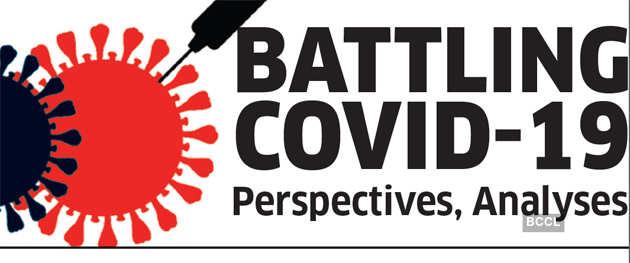
Ground zeroBy Rita McGrath & M Muneer
According to classic inflection point theory, everything looks fine — until it doesn’t. An inflection point can lead to new heights, or obliteration. The biggest dilemma for decision-makers is <when> to take action. Move too early, you’ll waste resources. Leave it till too late, you’ll get buried.
Covid-19 presents no such dilemma, since this inflection point is here and now. With the disappearance of ‘normalcy’, it’s important to acknowledge how awful this is going to be for a great many people dependent on daily wages and monthly salaries – not to mention for whom jobs are lost.
Using inflection points, we can build scenarios and early warning systems for the post-Covid-19 future. This will be a ‘thin-ice’ moment, as things are moving very quickly, but the framework may still be useful for decision-makers. This framework will articulate crucial uncertainties, define a ‘time-zero’ event and work backwards to create an early warning system.
Take four quadrants for potential post-Covid-19 economic scenarios. The first dimension (X-axis) shall be the current capitalistic ‘maximising shareholder value/profits’ and the new neo-socialist (or ‘stakeholder capitalism,’ if that earlier term makes you nervous) ‘maximising shared value’, where suppliers, customers, workers and society flourish along with businesses. The other dimension (Y-axis) can be the battered post-Covid-19 economy and the year-end bounced-back economy.
Four scenarios emerge. Two involving maximising shareholder value: (1) With economic catastrophe, the result could be pervasive poverty and inequality, economic insecurity even for the middle-classes, and political instability in many economies; (2) With the economy bouncing back, rinse-and-repeat of the last many years – the middle and lower classes continue to struggle, and high levels of inequality remain.
And two involving stakeholder capitalism: (3) When doom descends, grassroots protests could be accompanied by expanded social security programmes, greater taxation, and even some nationalisation of private wealth, with alliances between government and NGOs; (4) With the economy bouncing back, things will return to the consensus on distribution of societal wealth, inequality narrows gradually, and social goods are made more affordable.
Now, come up with a ‘time-zero’ event for each of the four scenarios — something that might represent either a positive or negative signal of an inflection point. Once these ‘time-zero’ events are established, work backward to identify information that would represent leading indicators of the event becoming a reality – for instance, economic inequality leading to economic collapse. If you see lots of indicators piling up, it is highly likely for the event to become real.
Despite the current crisis, the signals that any of the four scenarios outlined above could be in our future are weak. But the question is whether we can create strategies that are robust in the face of all of these possibilities, or whether we should bet on one.

Take the time-zero event in which governments crack down on profiteering private enterprises for the sake of ‘the 99%’. Some indicators may show a rise in the popularity of governments to take coordinated action; a wealth/land ceiling Act; political pressure to eliminate easy access to stock buybacks, and to encourage nationalisation; restrictions on executive compensation and CSR (corporate social responsibility) on turnover, not on profits; chatter over unpopular loan write-offs and bailout packages for the rich; minimum wage legislations, and increased health and social benefits to the blue collar workforce; elimination of tax loopholes and breaks to enterprises; middlemen eliminated in a new farm-to-fork co-operative model, etc.
These are not predictions. But it’s clear we are in the middle of an inflection point, and are going to be asking questions about many of our assumptions earlier taken for granted – for imstance, that globalisation and trade are always good; air travel should be ubiquitous; etc.
McGrath is professor, Columbia University, New York, US. Muneer is co-founder, Medici Institute Foundation for Diversity and Innovation, Bengaluru
Source: indiatimes.com

